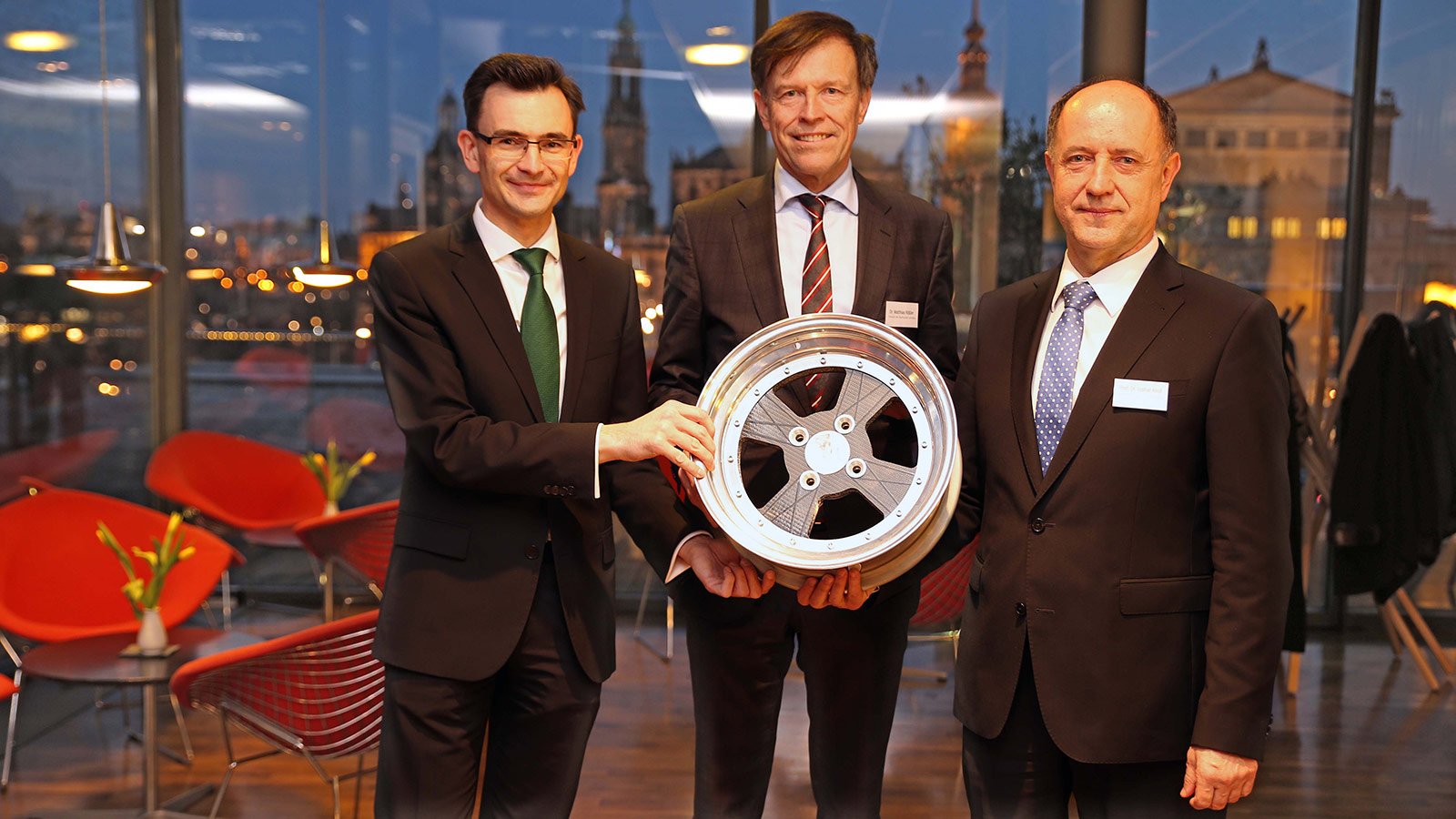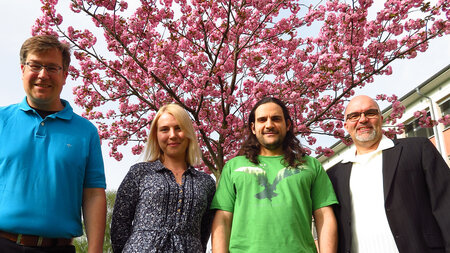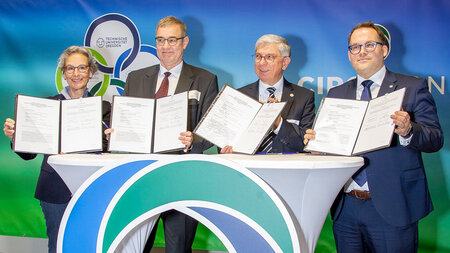„Parlamentarischer Abend“ delighted its guests
Successful premiere: 18 representatives of the Saxon State Parliament followed the invitation of the Chemnitz University of Technology on February 27, 2017 – intensive dialogue with the University
-

Focusing on the lightweight rim: In the framework of the first “Parlamentarischen Abend” of the Chemnitz University, Saxony’s President of the State Parliament Matthias Rößler informed himself on the Chemnitz top-level research from Chemnitz University President Prof. Gerd Strohmeier (l.) and Prof. Lothar Kroll, speaker of the Federal Cluster of Excellence MERGE. Picture: Diana Ruder
“It is an important matter to inform our Saxon representatives on what the Chemnitz University of Technology with support from the regional politics has achieved and will achieve in the future”, says Prof. Gerd Strohmeier, President of the Chemnitz University of Technology, at the beginning of the “Parlamentarischer Abend” in the Saxon State Parliament. 18 representatives of various parliamentary groups followed his invitation to the “Chiaveri” restaurant, among them the President of the Saxon State Parliament, Dr. Matthias Rößler, and Thomas Schmidt, Minister of State. Following the slogan “Chemnitz University in dialogue”, the rectorate and the senate of the Chemnitz University entered into conversation with the regional politics.
In his opening speech, Strohmeier showed impressive figures: approximately 100 nations study, research and teach at the Chemnitz University. With regard to the number of students, the Chemnitz University is the most international university in Saxony. Regarding the third-party funding per professor the university is among the top 10 in Germany. The university’s transfer ability was recently attested in the “Gründungsradar 2016” of the Donor’s Association: Today, the University is among all public universities in Saxony the Number 1. Strohmeier also emphasized the Federal Cluster of Excellence MERGE, the first and only national Cluster in the field of the promising key technology lightweight construction. “Our University will do everything to ensure that MERGE will stay a Chemnitz cluster”, Strohmeier emphasized. Furthermore, the Chemnitz University will take part in the Strategy of Excellence of the federal governments and federal states with an additional application. Although it was never intended to create an alliance cluster with the Technische Universität Dresden, the participation of Dresden researchers on Chemnitz projects and vice versa in the framework of the Federal Cluster of Excellence is appreciated. Additionally, the Chemnitz University is available as junior partner in the framework of a cluster application as a University of Excellence – which is useful regarding the changed framework conditions and the other competitors.
Regarding the high demand for teachers in Saxony, Strohmeier stressed once again that the Chemnitz University is more than willing to preserve and to expand the teacher training. However, it would still have to be financed by the Free State of Saxony and not interfere with other areas. The subject was also picked up by Matthias Rößler, President of the Saxon State Parliament, in his welcoming speech: “The securement of the teacher training at the Chemnitz University is very important.” Overall, he emphasized the importance of the Chemnitz University for the Free State. Stephan Meyer, chairman of the “Landtags-Ausschuss für Wirtschaft und Hochschule, Kultur und Medien” stressed the high impact of the Chemnitz University. As an example he used the entrepreneurial network SAXEED which is supported by the Free State and has counselled 540 entrepreneurial projects and established 140 companies with more than 400 jobs from 2006 till the end of 2016 in Chemnitz alone. In his opening speech he repeatedly reaffirmed that the Free State supports the Federal Cluster of Excellence MERGE: “The Federal Cluster of Excellence is supposed to stay in Chemnitz. I therefore hope for success and an even stronger presence of the Chemnitz University in the course of the Strategy of Excellence”, Meyer said. In this context, Holger Mann, deputy chairman of the “Landtags-Ausschuss für Wirtschaft und Hochschule, Kultur und Medien” referred to the strong competitive situation – not only at Saxon universities. In addition, he appreciated the new event format of the Chemnitz University in the state capital and was eager to participate in the discussions.
The representatives paid great attention especially to the research of the Federal Cluster of Excellence MERGE that aims at the fusion of large-scale suitable fundamental technologies from the fields of plastics, metal, textile, and Smart Systems for the development of resource-efficient products and production procedures. More than 100 researchers and technicians are currently working on the realization of the project that is funded by the German Research Association with more than 40 million euros from 2012 till 2018. “Europe’s biggest lightweight research institute will be established on the campus of the Chemnitz University”, said Kroll. It has even more importance regarding the ambitious climate goals. Every kilogram reduced in a car, for example, reduces the fuel demand and therefore the CO2 emission. For instance, the Chemnitz researchers managed to reduce the weight of a load-through facility by half and lower the production costs by 30%. That is why he appealed to the politicians: “If you carry on to invest in lightweight construction, you will be able to easily reach the climate goals!”
The Chemnitz University will apply for another Cluster of Excellence in its core competency “Humans and Technology” with the subject of “Human Factors in Technology: Mind, Movement, Embodiment”. Researchers of five departments at the Chemnitz University as well as from other universities and extramural research institutes are involved in the project. Prof. Georg Jahn, speaker of the cluster, illustrated the future challenges of interaction between humans and technology that have to be met. “The main objective of the cluster are embodied technologies that we already encounter nowadays”, said Jahn. No matter if autonomous driving, gesture based control of robots or the spatial orientation in virtual reality – the respective scientific questions are highly complex and require an interdisciplinary expertise. “This expertise can be found at the Chemnitz University due to a special solidarity between technical, humanitarian, and social sciences”, Jahn emphasized.
In the following conversations, many of the representatives commented very positive on the development and organization of the “Parlamentarischer Abend” and showed the willingness to travel to Chemnitz for the next information exchange. “There was nothing else on a Carnival Monday that could have been more fun”, the President of the State Parliament assured. Strohmeier said: “ We are planning to continue those “Parlamentarischer Abend” in order to carry on the intensive exchange with the representatives. This concept of dialogue is his particular concern which he already announced in his first letter to the university public. The Chemnitz University also invited via social media to this event. On Twitter, the discussions between politics and University could be followed – another kind of human-technology-communication.
Matthias Fejes
07.03.2017





